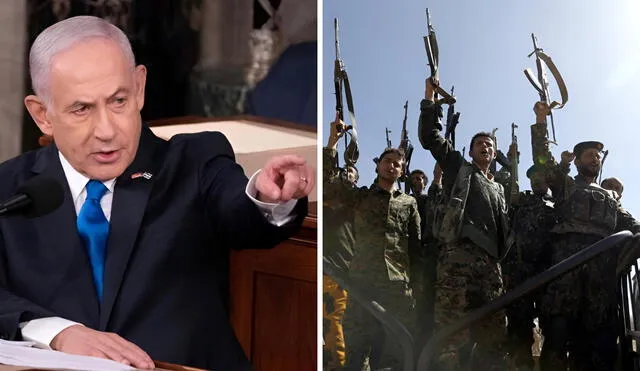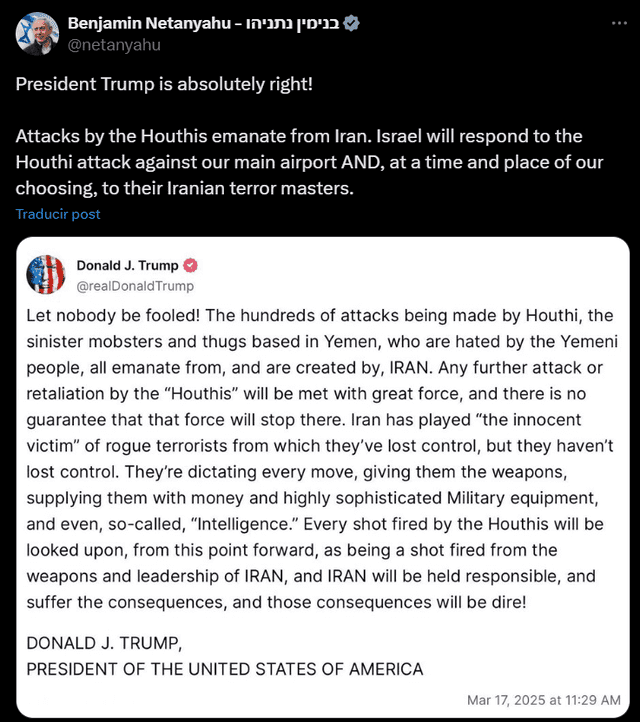Netanyahu vows retaliation against Houthis and Iran following Ben Gurion Airport attack
With Prime Minister Netanyahu vowing retaliation “at a time of our choosing,” Israel positions itself for a decisive response against Iran and its proxies — a move that could escalate tensions and reshape the regional balance of power.

Israeli Prime Minister Benjamin Netanyahu declared that Israel would retaliate against both the Iran-backed Houthi rebels in Yemen and Iran itself following a missile strike near Ben Gurion International Airport. The attack, which injured several individuals and disrupted airport operations, marked a significant escalation in regional tensions. Netanyahu emphasized that the response would occur "at a time and place of our choosing," underscoring Israel's intent to address threats from both the Houthis and their Iranian supporters.
The missile strike near Israel's main international airport highlighted vulnerabilities in the nation's defense systems, as the projectile evaded interception. This incident is part of a series of attacks attributed to the Houthis, who have launched numerous missiles and drones toward Israel since the onset of the Gaza conflict in October 2023. The Israeli government views these actions as direct provocations orchestrated by Iran through its proxy forces.

ALSO SEE: Illinois man sentenced to 53 years for hate crime murder of 6-year-old Palestinian-American
Israel strikes Houthi targets in Yemen to counter Iran’s regional influence and protect global trade
In response to the escalating threat, Israel has conducted airstrikes targeting Houthi positions in Yemen, aiming to disrupt their operational capabilities. These strikes have focused on critical infrastructure, including ports and energy facilities, which are believed to be used for receiving Iranian-supplied weapons. The Israeli Defense Forces (IDF) have stated that these operations are part of a broader strategy to neutralize threats posed by Iran's regional proxies.
Netanyahu has framed Israel's actions against the Houthis as part of a global effort to maintain international security, asserting that the rebel group's activities threaten not only Israel but also global trade routes and stability. He has called on the international community to recognize and address the broader implications of Iran's support for proxy groups like the Houthis. This perspective aligns with concerns from other nations regarding the Houthis' attacks on international shipping in the Red Sea.
Israel warns of expanded military action against Iran and proxies after Houthi Airport attack
The Israeli leadership's stance reflects a determination to hold Iran accountable for the actions of its allied groups. Defense Minister Israel Katz has echoed Netanyahu's sentiments, warning that any entity threatening Israel will face severe consequences. This approach indicates a potential for expanded military operations targeting not only the Houthis but also other Iranian-backed forces in the region. Netanyahu declared that Israel will respond to the Houthi attack on its main airport and will also target Iran, which supports the Houthis. He shared a post from US President Donald Trump, who warned Iran of direct retaliation for Houthi attacks.

Israeli Prime Minister Benjamin Netanyahu supports U.S. President Donald Trump's stance, reinforcing the commitment to hold Iran accountable for the Houthi attacks and regional instability. Photo: Benjamin Netanyahu X account
As Israel prepares for possible further retaliation, the situation remains tense, with the potential for broader conflict involving multiple regional actors. The international community continues to monitor developments closely, given the implications for regional stability and global security. Israel's commitment to responding decisively to threats underscores the complexities of the geopolitical landscape in the Middle East.
Houthis' hypersonic missiles raise alarm in Israel over precision and stealth capabilities
Israeli military analyst Amir Bar Shalom emphasized the remarkable precision of a missile launched from 2,000 kilometers away, noting its ability to evade Israel’s air defenses. Speaking to CNN, he called the strike a serious threat and stressed the need to assess whether it stemmed from internal errors or a new advanced capability. Bar Shalom also highlighted Iran’s ongoing development of long-range missiles with maneuverability to bypass air defenses, though it remains uncertain whether this technology has reached the Houthis. The Israeli army is currently examining all aspects of the failed interception, including detection timing, identification systems, and how close interceptors got to the missile.
The Palestinian militant group Hamas praised the strike, describing Yemen as “Palestine’s twin” in resisting oppression. The attack marked the third consecutive day of missile launches from Yemen toward Israel, according to the IDF. The Houthis claim their hypersonic missiles possess stealth features, a 2,150-kilometer range, high maneuverability, and speeds up to Mach 16, posing a growing concern for Israeli defense capabilities.













